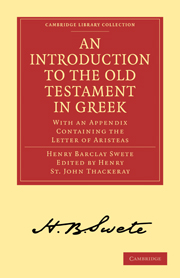Book contents
- Frontmatter
- PREFACE
- Contents
- PART I THE HISTORY OF THE GREEK OLD TESTAMENT AND OF ITS TRANSMISSION
- PART II THE CONTENTS OF THE ALEXANDRIAN OLD TESTAMENT
- PART III LITERARY USE, VALUE, AND TEXTUAL CONDITION OF THE GREEK OLD TESTAMENT
- CHAPTER I Literary use of the Septuagint by non-Christian Hellenists
- CHAPTER II Quotations from the Septuagint in the New Testament
- CHAPTER III Quotations from the Septuagint in early Christian writings
- CHAPTER IV The Greek Versions as aids to Biblical Study
- CHAPTER V Influence of the Septuagint on Christian Literature
- CHAPTER VI Textual condition of the Septuagint, and problems arising out of it
- ADDITIONS AND CORRECTIONS
- APPENDIX: THE LETTER OF PSEUDO-ARISTEAS
- INDICES
CHAPTER IV - The Greek Versions as aids to Biblical Study
Published online by Cambridge University Press: 05 August 2011
- Frontmatter
- PREFACE
- Contents
- PART I THE HISTORY OF THE GREEK OLD TESTAMENT AND OF ITS TRANSMISSION
- PART II THE CONTENTS OF THE ALEXANDRIAN OLD TESTAMENT
- PART III LITERARY USE, VALUE, AND TEXTUAL CONDITION OF THE GREEK OLD TESTAMENT
- CHAPTER I Literary use of the Septuagint by non-Christian Hellenists
- CHAPTER II Quotations from the Septuagint in the New Testament
- CHAPTER III Quotations from the Septuagint in early Christian writings
- CHAPTER IV The Greek Versions as aids to Biblical Study
- CHAPTER V Influence of the Septuagint on Christian Literature
- CHAPTER VI Textual condition of the Septuagint, and problems arising out of it
- ADDITIONS AND CORRECTIONS
- APPENDIX: THE LETTER OF PSEUDO-ARISTEAS
- INDICES
Summary
1. No question can arise as to the greatness of the place occupied by the Alexandrian Version in the religious life of the first six centuries of its history. The Septuagint was the Bible of the Hellenistic Jew, not only in Egypt and Palestine, but throughout Western Asia and Europe. It created a language of religion which lent itself readily to the service of Christianity and became one of the most important allies of the Gospel. It provided the Greek-speaking Church with an authorised translation of the Old Testament, and when Christian missions advanced beyond the limits of Hellenism, it served as a basis for fresh translations into the vernacular.
The Septuagint has long ceased to fulfil these or any similar functions. In the West, after the fourth century, its influence receded before the spread of the Latin Vulgate; in the East, where it is still recited by the Orthodox Church in the ecclesiastical offices, it lost much of its influence over the thought and life of the people. On the other hand, this most ancient of Biblical versions possesses a new and increasing importance in the field of Biblical study. It is seen to be valuable alike to the textual critic and to the expositor, and its services are welcomed by students both of the Old Testament and of the New.
- Type
- Chapter
- Information
- An Introduction to the Old Testament in GreekWith an Appendix Containing the Letter of Aristeas, pp. 433 - 461Publisher: Cambridge University PressPrint publication year: 2010First published in: 1900



